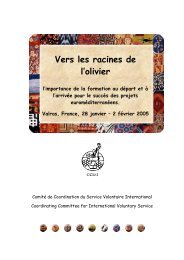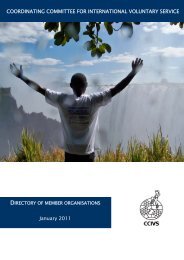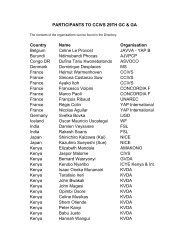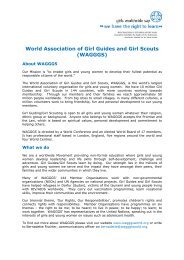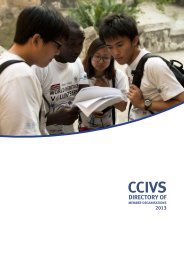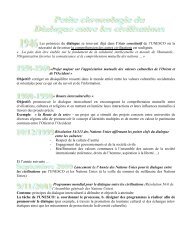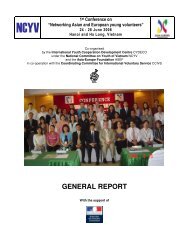Report of the Seminar 2005 - CCIVS
Report of the Seminar 2005 - CCIVS
Report of the Seminar 2005 - CCIVS
Create successful ePaper yourself
Turn your PDF publications into a flip-book with our unique Google optimized e-Paper software.
EU-LA <strong>Seminar</strong><br />
Work <strong>of</strong> <strong>the</strong> organisations.<br />
Due to <strong>the</strong> nature <strong>of</strong> our organizations, which is non-pr<strong>of</strong>it, and in some way with a liberal-spirit<br />
approach, <strong>the</strong>re is a lack <strong>of</strong> support and recognition from different governments, local authorities<br />
and private enterprises. Therefore, an evidence <strong>of</strong> financial difficulty and <strong>the</strong> need <strong>of</strong> material<br />
support from <strong>the</strong> local/general community arise as a consequence. This fact can also bring a<br />
misconception on what <strong>the</strong> purpose <strong>of</strong> help/support and volunteering is all about. It is possible that<br />
some organizations could have <strong>the</strong> idea <strong>of</strong> being lonely in <strong>the</strong>ir efforts <strong>of</strong> promoting and broaden <strong>the</strong><br />
scope <strong>of</strong> <strong>the</strong>ir activities.<br />
There is a challenge on changing in certain sectors <strong>of</strong> <strong>the</strong> population, especially young people, <strong>the</strong><br />
perception that international volunteering programmes are a cheap way to travel. In addition to that,<br />
<strong>the</strong>re is a reality <strong>the</strong>y have to face when it comes to volunteering, which is <strong>the</strong> fact that <strong>the</strong>y are not<br />
going to “save <strong>the</strong> world” but to cooperate with and support local communities or people through<br />
<strong>the</strong>ir participation in different or specific activities in o<strong>the</strong>r country. Ano<strong>the</strong>r issue is <strong>the</strong> general<br />
problem with visas for volunteers, in some countries it is not mentioned that foreigners come to<br />
work as volunteers and <strong>the</strong>y are given tourist visas because sometimes <strong>the</strong> volunteer status is not<br />
recognized for that purpose.<br />
For those reasons we face different challenges first on <strong>the</strong> governmental and institutional extent and<br />
secondly with <strong>the</strong> community itself because <strong>the</strong>re is a need to develop a more sensitive behaviour<br />
and commitment towards volunteering as well as dealing with <strong>the</strong> individualism culture.<br />
Unfortunately we did not discuss general alternatives or ways to solve <strong>the</strong>se aspects, but we agreed<br />
that we are in a first step to identify general things to work within <strong>the</strong> different networks <strong>of</strong><br />
volunteering associations; <strong>the</strong>refore, a reason to work toge<strong>the</strong>r in cooperation.<br />
Tools <strong>of</strong> voluntary service.<br />
The different networks and international organisations were presented (see in <strong>the</strong> annexes) and <strong>the</strong>re<br />
were discussions on <strong>the</strong> exchanges in smaller groups.<br />
Short presentation <strong>of</strong> <strong>CCIVS</strong>: www.unesco.org/ccivs<br />
The Coordinating Committee for International Voluntary Service (<strong>CCIVS</strong>) was created in 1948 in<br />
order to work for peace, multicultural exchanges, friendship between countries through voluntary<br />
service. <strong>CCIVS</strong> has about 120 national and international NGOs in its membership, and <strong>the</strong>y are<br />
involved in voluntary service. The General Assembly <strong>of</strong> <strong>CCIVS</strong> takes place every 3 years. So every<br />
3 year an Executive Committee is elected. The secretariat <strong>of</strong> <strong>CCIVS</strong> is located in Paris, inside <strong>the</strong><br />
UNESCO building (<strong>the</strong>re are only 18 NGOs with formal relations <strong>of</strong> association with UNESCO and<br />
<strong>CCIVS</strong> is one <strong>of</strong> <strong>the</strong>m), and 4 people work <strong>the</strong>re: 2 volunteers and 2 employees. Ideas for projects<br />
do not come from this secretariat but from members <strong>of</strong> <strong>CCIVS</strong> who express a need or a project.<br />
<strong>CCIVS</strong> mainly organises 2 types <strong>of</strong> seminar: those involving regional cooperation; and those with a<br />
special <strong>the</strong>me. <strong>CCIVS</strong> also lobbies institutions in order to develop international voluntary service.<br />
Short presentation <strong>of</strong> <strong>the</strong> Alliance: www.alliance-network.org<br />
In <strong>the</strong> 80s, 5 independent national organisations (not belonging to SCI and YAP at that time)<br />
decided to create a technical platform to promote voluntary service. The organisation was created<br />
by organisations running workcamps. It is a not very binding organisation as <strong>the</strong> decisions made by<br />
<strong>the</strong> GA do not have to be implemented by <strong>the</strong>ir members. Around 2000 <strong>the</strong>re were around 30<br />
members from Europe, but also from Asia and Latin America. At that time <strong>the</strong>re was a crossroad<br />
8



